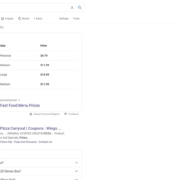What is a Google Core Update? Understanding How Google Updates Its Search Engine
A little secret that you may not know about Google’s search engine is that the company updates it regularly. This is what we in the marketing world refer to as a Google Core Update.
Google Core Updates happen “all the time” according to the search engine giant, but the real major ones that can be devastating to your SEO strategy happen about once every year.
To add insult to injury, Google doesn’t usually give its users an explanation as to what they changed in these updates, leaving industry leaders scrambling to figure it out.
Most of these updates are slight tweaks, which makes them barely noticeable, but when your traffic starts to dip and then totally drown, you know that it’s likely a new algorithm at play.
And just like that, you’re trapped in Google’s Matrix, figuring out why you are now on the second page of Google for your top keyword… It can happen just like that.
What is a Google Core Update and Why Do They Do Them?
If your business depends on web traffic and SEO, then you know how challenging it is to figure out the mysterious core update that changed everything, yet Google tells you nothing. It can be very frustrating if you have worked hard on your SEO strategy and thought you had every keyword perfectly blended into your content with every ranking signal in its right place.
Unfortunately, that’s just how it goes sometimes with SEO. But in order to do better next time, you need to know better.
A Google search engine update is when the search engine makes a significant change to its algorithm and how the system ranks websites.
An algorithm is an integrated system that retrieves data from the historical search index (containing web content from all time and all places) and instantly delivers the best possible result for someone’s query in real-time.
To rank highly in Google, your website has to send signals that match what the algorithm is looking for. If your content is relevant, trustworthy and insightful, it may still never see the front page of Google because you don’t send any other ranking signals.
This is why businesses have to change their strategy every few years to stay ahead of Google’s core updates.
What Have Google Updates Changed in the Past?
As you probably know, there are numerous signals for determining rank. While some tactics start off working for SEO (such as sponsored posts and mini-sites), Google developers soon catch on and make changes to de-rank content considered to be “spam.”
However, sometimes the search engine can change things so drastically that original content may suddenly be penalized due to something as simple as a link that Google wanted to eliminate from results.
The following updates made many businesses change their tactics:
Featured Snippet Update – January 2020
In rare form, Google decided to divulge that they were changing the number of times that a URL can show for a featured snippet. Websites that show for a featured snippet cannot appear again in the first 10 results.
BERT Update – October 2019
After this update occurred, Google mentioned that this was their biggest change in 5 years without saying what exactly it included. As of now, the update affects 10% of all queries, but Google may very well roll out this core algorithm update to all results, as it has done in the past.
BERT stands for bidirectional encoder representations from transformers. The transformer, in this case, stands for systematic models that process words as they relate to all other words in the same sentence. Basically, it tries to understand the meaning of the word by looking at all the words around it.
In essence, the search engine got a boost in intelligence, so if you had been ranking highly for a keyword and suddenly lost traffic after 2019, then you may need to double-check your content and possibly add new questions or updated information to stay relevant on the SERP.
Fred – March 2017
This major Google update to the core algorithm was once again downplayed, but it turned out to be a nightmare for the websites it affected. While no specifics were ever shared, the update seemed to attack “low-value content.” This came to mean content that was written poorly, did not have sources, linked to spammy websites or was promotional in nature.
Penguin, Panda and Other Google Updates
Many of these earlier updates targeted spammy content that contained backlinks from toxic websites that were low-quality and made just for SEO. Black hat SEO marketers were hit heavily by these.
As mentioned, search engines won’t tell you exactly what changed about the algorithm. This is a typical Google-type response They may very generally explain the “routine update,” but won’t go into how it may lead to a drop in traffic for content publishers who thought their SEO strategy was top-notch?
What Can You Do to Prepare for a Google Search Engine Update
Is it time to overhaul your strategy or just make small changes to your content? The answer depends on how many pages have been de-ranked and how much traffic you are losing.
Analyze What’s Going Wrong
Is your traffic down overall? What pages lost the most traffic? What keywords lost the most traffic? Do you have any penalties listed in Google Search Console?
It’s best to look at pages individually and conduct a content audit to see if you have fallen behind in your format, markup or overall quality.
Something an SEO agency would do in addition to that would be an SEO audit. Utilizing a variety of SEO tools, the agency would be able to provide you with a comprehensive audit and report of your organic rankings and areas where you could improve.
Add Long-Tail Keywords as Questions to Beef Up Your Content
Many businesses have had to beef up their content with new voice SEO keywords. These are strategically added into areas like a frequently asked questions section or a small guide to content.
This strategy works best when you have an expert who’s answering questions and possibly providing images or video content to go along with the answer.
Google Wants Relevance More than Anything
The main reason for the BERT update was because Google wants the most relevant result to show for the query by making sure a computer understands natural linguistics. Essentially, it wants to predict the best answer in an instant.
Your content has to be that good to get on the first page. If you overuse keywords or use duplicate content, it’s likely that you will lose rank over time, especially if BERT is rolled out to 100% of search engine results.
Google is showing that it’s less concerned with keyword placement and density than it is with the natural flow and readability of the content, as well as how much it’s shared across the web.
Need Help with Your SEO?
You don’t have to worry about Google algorithm updates with an SEO agency on your side. At iSynergy, we work on your behalf to create algorithm-loving strategies that match exactly what Google is looking for.
Talk to us about improving your strategy or ask us questions about the latest Google Core Updates… and how to fix your site.











